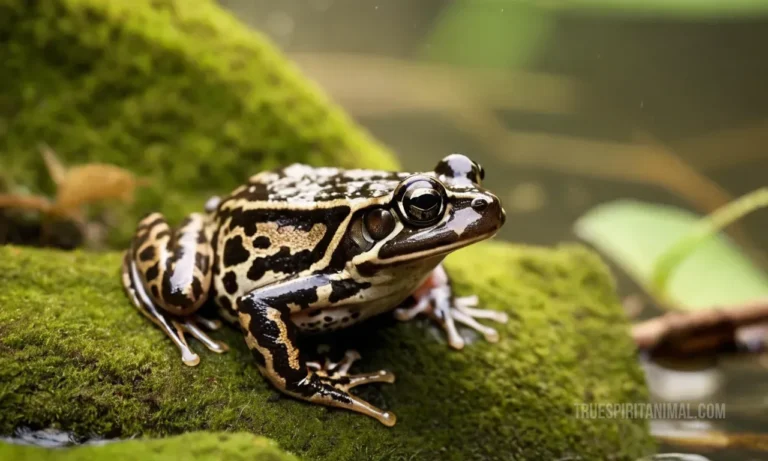Edible Frog Symbolism and Meaning

Introduction
The edible frog is a fascinating creature that has been a part of human culture for centuries, both as a food source and in various symbolic representations. This article will explore the different meanings associated with this amphibian and its significance in various cultures around the world. From ancient mythology to modern-day folklore, the edible frog holds a unique place in our collective consciousness.
Edible Frog as Food Source
Frogs have been consumed by humans for thousands of years, particularly in Asia where they are considered a delicacy. In Chinese cuisine, frog legs are often deep-fried and served with garlic sauce or stir-fried with vegetables. They’re also used in soups and stews. In some parts of Africa, frogs are eaten whole, while in South America, they’re typically grilled or fried. The edible frog is not only a source of protein but also rich in vitamins and minerals like potassium, calcium, magnesium, zinc, and iron. In many cultures, it symbolizes abundance and prosperity due to their rapid reproduction rate and ability to survive in various environments.
Edible Frog in Mythology and Folklore
In ancient Greece, frogs were associated with the goddess Hecate, who ruled over magic and witchcraft. In Hindu mythology, they symbolize transformation and rebirth, as they metamorphose from tadpoles to adults. Native American tribes viewed them as messengers of rain and fertility. African cultures considered them symbols of good luck and prosperity. The Aztecs believed that eating frogs could bring about good fortune. In Japan, the frog is a symbol of longevity because of its long life span.
Edible Frog in Western Culture
In Western culture, the edible frog has been used metaphorically to represent transformation and adaptability. The phrase “a frog in the pot” refers to someone who adapts well to changing circumstances. In fairy tales like “The Frog Prince,” it symbolizes personal growth and self-improvement. Frogs are also linked with healing properties, especially in traditional Chinese medicine where they’re believed to cure skin diseases.
Edible Frog in Eastern Culture
In Chinese culture, frogs represent good luck and abundance. They’re often given as gifts during the Lunar New Year for prosperity. In Japan, they symbolize longevity due to their long life span. In Vietnamese culture, they signify wealth and fertility. In India, they’re associated with rain and agriculture.
Edible Frog in Native American Culture
Native Americans saw frogs as symbols of rebirth and renewal. They believed that eating them brought good fortune. The Hopi tribe considered them sacred, while the Iroquois used their skin for ceremonial purposes.
Edible Frog in African Culture
In Africa, frogs are seen as omens of rain and prosperity. In West African folklore, they’re associated with fertility and abundance. The Yoruba people associate them with the goddess Oya, who controls storms and fertility.
Edible Frog in Asian Culture
In Japan, frogs are considered lucky charms for longevity because of their long life span. In Chinese culture, they represent wealth and prosperity during the New Year celebrations. They’re also eaten to ensure good health and fortune.
Conclusion
The edible frog holds deep symbolic meanings across cultures. It represents transformation, adaptability, fertility, abundance, longevity, and prosperity. Its consumption signifies resilience and resourcefulness. Despite being a food source, it carries profound spiritual significance across various societies. Understanding these meanings can enrich our appreciation of this amphibian beyond its culinary value.




